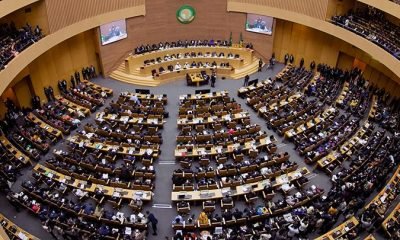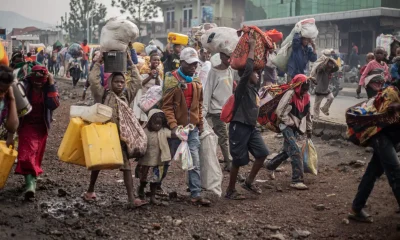Analysis
Rwanda’s Tragic Past: Lessons Unlearned and Calls for International Action

In solemn commemoration of the 30th anniversary of the 1994 genocide against the Tutsi ethnic group in Rwanda, the world pauses to revisit the harrowing events of those dark days. Amidst the somber reflection, experts analyze the critical junctures where intervention could have altered the course of history.
In a span of one hundred days, the world witnessed the unfathomable brutality that claimed the lives of an estimated 600,000 to 800,000 Rwandans. Targeted primarily due to deep-rooted ethnic tensions, the Tutsi minority and moderate Hutus faced systematic persecution and annihilation.
Yet, amidst the bloodshed and cries for help, the international community remained paralyzed, failing to uphold its legal and moral obligation to prevent genocide. Despite the presence of the United Nations Assistance Mission for Rwanda (Unamir), established to support peace efforts, the atrocities unfolded unabated.
Drawing from a deep well of research and analysis, experts reflect on three crucial pillars that could have averted the catastrophe: detailed intelligence, preventive measures, and political will.
In hindsight, the importance of detailed intelligence cannot be overstated. Numerous sources, ranging from informants to journalists, provided ample warning signs of impending genocide. However, a lack of analytical capacity and decisive action left the UN mission incapacitated and blind to the impending disaster.
Moreover, opportunities for preventive action were squandered. Early intervention could have deterred the genocide at its inception, potentially saving countless lives. Yet, despite mounting evidence and pleas for assistance, the inertia of political bureaucracy prevailed, paving the way for unimaginable suffering.
At the heart of the tragedy lies a stark absence of political will. Dominated by cautious apprehension, the international community faltered in its commitment to intervene, haunted by the specter of past failures. The repercussions of inaction reverberated far beyond Rwanda, underscoring the urgent need for collective responsibility and decisive leadership.
Looking ahead, the lessons of Rwanda serve as a clarion call for proactive engagement and unwavering resolve. By fostering a sense of enlightened self-interest and upholding the principles of international law, nations can pave the path towards a future free from the scourge of genocide.
As the world grapples with ongoing conflicts and humanitarian crises, the legacy of Rwanda implores us to heed the warning signs and act decisively to prevent future atrocities. Only through concerted efforts and unwavering determination can we honor the memory of the fallen and safeguard the sanctity of human life.
In remembrance of the lives lost and the resilience of the Rwandan people, let us reaffirm our commitment to justice, reconciliation, and the pursuit of a world where such horrors are never again allowed to transpire.
Analysis
How Russia Is Bleeding Western Security Without Firing a Shot
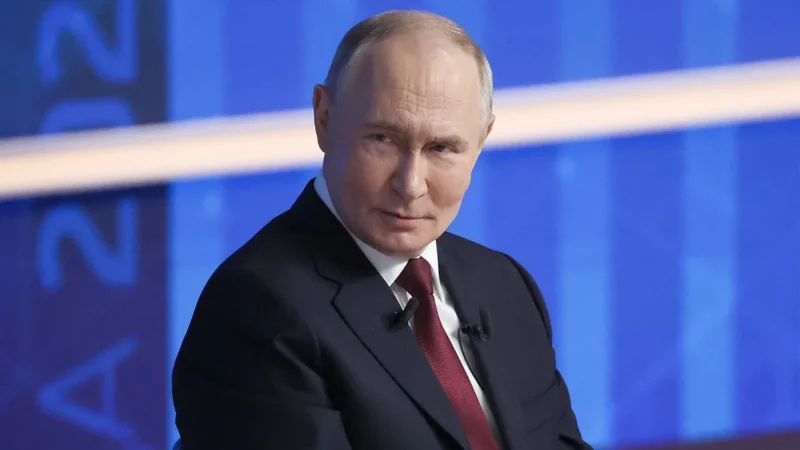
A broken train line in Poland. Fires in Estonia. Balloons from Belarus. None of it is random — and all of it is costing Europe more than Moscow ever pays.
Europe is confronting a form of warfare that leaves no craters, no front lines and few public acknowledgments — yet steadily drains its security capacity. Western intelligence officials say Russia is deliberately overwhelming European states through a sustained campaign of sabotage designed to be cheap for Moscow and exhausting for everyone else.
The evidence is mounting. In eastern Poland, a passenger train carrying nearly 500 people was forced to stop after an overhead line collapsed, smashing windows and damaging tracks. Elsewhere on the same route, explosives detonated beneath a freight train. No one was killed, but Warsaw reacted as if the warning was unmistakable: 10,000 troops were deployed to protect critical infrastructure. Polish authorities blamed Russia’s intelligence services.
That incident is one of at least 145 cases logged in an Associated Press database that Western officials link to Russia, its proxies or its ally Belarus since the invasion of Ukraine in 2022. The acts range from arson and explosives plots to cyberattacks, vandalism and warehouse fires. Most cause limited physical damage. That is precisely the point.
European intelligence officials say the real cost lies in the response. Every incident triggers multinational investigations, intelligence sharing and surveillance operations. One senior intelligence chief told AP that Russian interference now consumes as much agency time as counterterrorism. From Moscow’s perspective, tying up Europe’s security machinery is already a strategic win.
The scale is accelerating. AP data shows arson and explosives plots jumping from one documented case in 2023 to 26 in 2024, with several more already recorded in 2025. Poland and Estonia — both bordering Russia and among Ukraine’s strongest backers — are the most frequently targeted, followed by Germany, France, the U.K. and Latvia.
Officials believe Moscow briefly slowed the campaign late last year, likely to avoid antagonizing the incoming Trump administration in Washington. That pause is over. “They are back to business,” one European official said.
Russia’s method is calculated. Rather than risking trained intelligence officers, Moscow outsources operations to criminals, smugglers and foreign nationals with little to lose. Recruits are often found in prisons or through organized crime networks. One suspect linked to sabotage of Polish railways had worked for Russia’s GRU while moving across borders unnoticed, exploiting gaps in intelligence sharing.
Even failed plots serve a purpose. In Lithuania, a cache of drone parts and explosives hidden in a cemetery was uncovered before an attack could occur — but only after months of surveillance and coordination. In Latvia and Estonia, foreign operatives with no local ties have forced authorities into cross-border manhunts stretching from the Baltics to Italy.
The strategy is brutally efficient. Europe spends millions to stop attacks that cost Moscow almost nothing to organize.
Yet the pressure has produced one unintended effect: deeper cooperation. Baltic prosecutors have formed joint investigation teams. British police are training officers to recognize state-backed sabotage. Intelligence sharing is improving, even as Russia tests new methods — from arson to weather balloons drifting from Belarus that repeatedly shut down airports.
For now, the damage remains limited. But officials warn the campaign is evolving. What carries cigarettes today, they note, could carry something far more dangerous tomorrow.
This is not chaos. It is a system — and Europe is learning, belatedly, that the quiet wars can be the most corrosive of all.
Analysis
China’s EUV Breakthrough and the AI Warfare Balance

China’s reported development of a prototype extreme ultraviolet (EUV) lithography machine—a critical piece of technology long monopolized by Western firms—may have implications far beyond commercial competition in chips. Sources say that Chinese scientists, including former engineers from Dutch semiconductor equipment maker ASML, assembled a working EUV prototype capable of generating the extreme ultraviolet light needed to etch the tiny circuits used in advanced semiconductor manufacturing.
This marks a significant step toward Beijing’s goal of self-sufficiency in chip production and could reshape how China participates in the global AI and military competition.
Why EUV Matters for AI and Military Power
EUV lithography machines are essential for producing the most advanced chips that power artificial intelligence models, data centers, and high-performance computing—technologies increasingly central to AI-driven military systems and defense capabilities. These chips are a core enabler of autonomous systems, real-time battlefield decision-making, and advanced signal processing. Without access to EUV, a country is effectively shut out of producing the hardware foundations of cutting-edge AI.
For years, export controls by the United States and its allies have restricted China’s access to EUV machines and advanced AI chips precisely because of their dual-use nature—civilian but also critical for military systems. These controls are intended to slow China’s progress in military applications of AI and maintain Western technological superiority.
China’s first EUV prototype suggests it could circumvent some layers of that control, potentially accelerating its ability to internally produce high-end semiconductors that drive AI advances in both commercial and military domains. While the prototype is not yet producing chips, its ability to generate EUV light is a milestone that many analysts believed was years away.
The AI Arms Race and Global Military Balance
Advanced semiconductors are not a luxury—they are strategic military assets. In modern warfare, AI-enabled systems are proliferating rapidly: autonomous drones, sensor networks, real-time command and control, and predictive analytics all depend on advanced chips. As a result, the race for AI superiority overlaps directly with military competition between major powers. Observers often frame this competition as an “AI Cold War,” in which dominance in AI technology and hardware translates into battlefield advantage, deterrence capability, and geopolitical influence.
If China can develop and mass-produce its own advanced chips using domestic EUV technology, it could narrow the technology gap that has so far given the United States and its allies an edge in military AI applications. That includes everything from autonomous systems to real-time battlefield simulations and secure AI-driven cyber defense. The ability to control this part of the supply chain would reduce China’s vulnerability to export controls and strengthen its position in future conflict scenarios where AI plays a decisive role.
Policy and Strategic Implications
For the United States and its partners, this development raises hard questions about the assumptions underlying current export controls and military planning. To date, U.S. efforts have aimed to contain China’s access to critical semiconductor manufacturing tools and advanced AI hardware, seeing this as fundamental to maintaining a strategic advantage across civilian and defense sectors. That strategy is grounded in the belief that access to high-performance computing and AI chips underpins future battlefield success and strategic deterrence.
However, if China continues to close the technological gap—even incrementally—it could force a recalibration of how export controls, multilateral alliances, and technology policy are employed to maintain an AI lead. This shift could also affect allied nations that currently benefit from U.S. chip technology dominance, pushing them to reassess their own semiconductor strategies and defense modernization plans.
Not a Done Deal—Yet
It is important to emphasize that China’s EUV prototype is still not mass-producing chips and remains far less sophisticated than the machines used by industry leaders like TSMC or Intel. Many technical hurdles remain, particularly in optics and production scalability. Critics also note that successfully generating EUV light, while significant, does not automatically translate into full chipmaking capability.
Nevertheless, the development signals that China’s resolve to master the hardest elements of semiconductor manufacturing is stronger than many analysts had expected—underscoring how semiconductor technology is now inseparable from global competition, economic strategy, and military balance.
Conclusion: A New Dimension of the AI Arms Race
China’s reported EUV prototype does not yet rewrite the rules of the global semiconductor landscape, but it does redefine the timeline and stakes. In an era where artificial intelligence increasingly shapes military strategy and operational capability, control over the hardware that fuels AI is no longer a commercial advantage alone—it is a strategic imperative.
As rivals pursue their own national semiconductor goals, the emergence of China’s EUV capabilities could mark the beginning of a more contested, multipolar era in both technology and military power.
Analysis
How a Trump–Ilhan Omar Political Cartoon Went Viral in Somalia—and Why It Matters

A U.S. political cartoon targeting Ilhan Omar has gone viral in Somalia and Somaliland, revealing how American domestic politics now shape perceptions and soft power in the Horn of Africa.
A single political cartoon depicting former U.S. President Donald Trump attacking Congresswoman Ilhan Omar has crossed oceans and political systems, morphing from a piece of American partisan commentary into a viral symbol across Somalia and Somaliland. Its unexpected afterlife in the Horn of Africa offers a revealing case study in how U.S. domestic politics now reverberate far beyond American borders, often in ways Washington neither anticipates nor controls.
The image—showing Trump aiming arrows at Omar—was originally intended for an American audience familiar with the former president’s rhetorical assaults on the Minnesota lawmaker. But once it entered Somali digital spaces, its meaning shifted.
In Mogadishu and Hargeisa, the cartoon is not consumed as satire or partisan critique; it is read as a visual metaphor for hostility toward Somalis themselves. Omar’s identity as the first Somali-American elected to Congress has fused her personal political battles with a broader communal narrative of representation, pride, and vulnerability.
This transformation underscores the power of diaspora politics as a two-way transmission channel. Somali communities abroad do not merely absorb Western political narratives; they export them back to the homeland, stripped of their original context and reframed through local histories of displacement, marginalization, and survival.
For many viewers in Somalia and Somaliland, the arrow imagery evokes memories of persecution and exclusion, reinforcing fears about the conditional acceptance of Muslims and Africans in Western societies.
The viral spread of the cartoon also exposes a critical vulnerability in U.S. soft power. At a time when Washington is competing with Beijing and Moscow for influence in the Horn of Africa—while relying on Somali partners for counterterrorism cooperation—perceptions matter.
Images suggesting hostility toward Somali-Americans weaken America’s moral authority and provide ready-made material for rival narratives portraying the United States as hypocritical or exclusionary. What begins as domestic political theater can quickly become strategic ammunition abroad.
The episode highlights a deeper structural reality: the collapse of the boundary between domestic and foreign messaging. In a hyperconnected world shaped by social media and diaspora networks, American political rhetoric is no longer confined to U.S. voters.
Attacks framed for domestic consumption are instantly reinterpreted in foreign contexts, where they interact with local grievances and geopolitical competition.
For U.S. policymakers, the lesson is uncomfortable but unavoidable. Cultural wars waged at home increasingly have international consequences, particularly in regions where identity, migration, and historical trauma intersect.
Whether American political leaders choose to acknowledge this reality or continue to treat domestic messaging as cost-free abroad will shape not only elections, but also America’s standing in regions where influence is quietly slipping.
The cartoon’s journey from Washington to Somalia is not an anomaly. It is a warning sign of a world in which every image, every insult, and every political performance now travels globally—often faster than diplomacy can keep up.

Analysis
Is Britain Preparing to Ban the Muslim Brotherhood?

Rising Gulf Pressure, U.S. Policy Shifts, and Westminster’s Security Calculus
Britain’s longstanding ambiguity toward the Muslim Brotherhood is entering an unprecedented phase of scrutiny, as Downing Street confirms that the movement is undergoing an in-depth security review — a step widely interpreted as the first real indication that London may soon consider an outright ban.
The announcement reflects a convergence of domestic political anxiety, intensifying Gulf pressure, and a rapidly shifting global context shaped by Washington’s renewed push under President Donald Trump to designate Brotherhood networks as foreign terrorist organizations.
U.S. Preparing to Label Muslim Brotherhood a Terrorist Group, Trump Says
British security officials increasingly argue that the Brotherhood’s activities pose a growing threat, citing attempts to infiltrate government structures through charitable, academic, and political fronts.
Intelligence assessments suggest the organization operates through layered networks that blur the line between public advocacy and clandestine ideology, creating what analysts describe as a “soft penetration” of British civil society. Supporters insist the Brotherhood is a socio-political movement, but critics counter that this ambiguity is precisely what enables ideological radicalization beneath the surface.
This shift comes at a moment when structural political dynamics are aligning against the group. In Parliament, Foreign Secretary Yvette Cooper publicly acknowledged concerns about the Brotherhood’s potential role in fueling extremism abroad after Reform UK leader Richard Tice pressed her on whether the review could lead to a formal ban.
While Cooper avoided a categorical answer, the mere framing of the debate marks a stark departure from Britain’s historic reluctance to confront the group directly. Nearly a decade after David Cameron’s 2015 review concluded that key Brotherhood practices conflicted with democratic values but stopped short of recommending proscription, British policymakers appear closer than ever to revisiting that decision.
External pressure is amplifying this domestic reassessment. The UAE and Egypt — two of the Brotherhood’s most uncompromising opponents — have invested significant diplomatic capital into urging London to follow their example. Abu Dhabi has even escalated its pressure by placing eight UK-based organizations on its own terrorism list, an extraordinary step that British analysts interpret as a direct challenge to London’s permissive environment for Islamist political activity.
British media outlets, including The Spectator and LBC, warn that the UK risks becoming a “safe haven” for the group at a time when Gulf states, France, and even Germany are tightening restrictions on political Islam.
The debate is increasingly shaped by allegations that the Brotherhood is exploiting the openness of British institutions. Former RUSI vice president David Abrahams describes the group’s strategy as a sophisticated political project that infiltrates local councils, academic platforms, and government consultations while masking extremist ideological commitments behind human-rights rhetoric.
He argues that the Brotherhood seeks not to win power through direct confrontation but through gradual institutional capture, using accusations of Islamophobia to silence internal Muslim critics and position itself as the representative voice of British Muslims.
At the same time, a parallel ecosystem of misinformation — often amplified by foreign actors such as the UAE — has blurred the line between legitimate critique and politicized smear campaigns. Investigations revealed that Emirati-funded intelligence operations targeted critics through fabricated narratives, manipulated online content, and pressure on financial institutions.
Even respected humanitarian organizations like Islamic Relief have faced reputational attacks despite passing rigorous British oversight standards. This environment has created a dangerous feedback loop in which Islamophobia and authoritarian foreign agendas reinforce each other, widening mistrust and complicating legitimate counter-extremism policymaking.
Yet the Brotherhood’s position is also evolving. According to political analyst Ibrahim Khatib, the group is already preparing contingency measures in anticipation of tightening Western pressure, including relocating research and financial hubs to Malaysia and cultivating political links in Asian and Latin American capitals.
These moves suggest an emerging phase of global repositioning, designed to preserve influence even if the UK and U.S. adopt more hostile postures.
The broader context — particularly Washington’s shift under Trump’s second term — places London in a tightening vice. As the United States moves closer to formal terrorist designation and Gulf allies intensify lobbying, Britain’s historical strategy of “managed ambiguity” is becoming increasingly untenable.
If security assessments conclude that Brotherhood activity contributes to ideological extremism or foreign influence operations, a ban may no longer be a theoretical outcome but a political inevitability.
For now, no final decision has been taken. But the political mood in Westminster, the pressure from Gulf partners, and the alignment with U.S. counter-Islamist strategy point to a watershed moment.
The Muslim Brotherhood may soon face the most serious legal and political challenge it has encountered in the West — and Britain may be forced to decide whether it continues to serve as a pluralistic refuge or follows its allies into a new era of confrontation with political Islam.
Analysis
The Awdal Model: Traditional Leaders as Architects of Security

National Resilience and the Architecture of Peace: Somaliland’s Strategic Defense Against Destabilization
A Comprehensive Analysis of Traditional Leadership and State Strategy in Maintaining Stability
The recent, swift resolution of internal security issues in Borama, the capital of the Awdal region, stands as a critical testament to the durability of Somaliland’s unique peace architecture. While the incident itself was identified as another maneuver by external forces—or “enemies of Somaliland”—to destabilize the nation, the successful containment by local traditional leaders, backed by the strategic posture of President Abdirahman Mohamed Abdullahi Irro, provides a powerful blueprint for national resilience.
This analysis explores how the core tenets of Somaliland’s historical peace-making culture are actively deployed as the nation’s primary defense mechanism against ongoing geopolitical threats.
I. The Awdal Model: Traditional Leaders as Architects of Security
The incident in Borama threatened to replicate the chaotic conditions that other regions have experienced, conditions often exploited by external hands seeking to undermine the Republic. However, the response from the traditional leaders of the Awdal region was decisive and strategically sound.
Their primary achievement was twofold: diagnostic clarity and proactive ownership.
Diagnostic Clarity: The leaders immediately cut through the local grievance and identified the disturbance as a “trap set by the enemies of Somaliland.” This public framing was crucial. It shifted the focus from internal discord to external manipulation, effectively neutralizing the political fuel required for escalation.
Proactive Ownership: By collaborating directly with state security forces and issuing a unified call for peace, the traditional leaders asserted their moral and legal authority. The handover of security to the police and the willing compliance of the Borama populace demonstrates the foundational strength of the social contract in this region. This collective action affirms Borama’s historical status as the “mother of knowledge” and a profoundly peace-loving community, one that values education and stability above manufactured conflict.
This Awdal model illustrates that the Guurti (the Council of Elders) and local traditional authorities are not merely symbolic figures, but active, co-governing partners whose moral capital is irreplaceable in moments of crisis.
The Strategic Mandate of President Abdirahman Mohamed Abdullahi Irro
The effectiveness of the traditional leaders’ intervention was magnified by the strategic latitude provided by President Irro. His approach was defined by an acute understanding of regional dynamics and the necessary decentralization of conflict resolution.
President Irro’s strategy demonstrated three key principles:
Trust in Traditional Authority: By granting the traditional leaders a significant opportunity to lead the resolution, he avoided a premature, heavy-handed security response that could have alienated the local population and played into the hands of external plotters. This trust signaled respect for local autonomy and indigenous conflict resolution mechanisms.
Historical Contextualization: As the Awdal region is the historic birthplace of modern Somaliland governance in the early 1990s, President Irro’s actions honored this legacy. He recognized the deep, entrenched loyalty to the peace project that permeates the region’s identity.
Executive Foresight: The President’s ability to take “full control of the matter” was not about micro-managing, but about setting the overall strategic perimeter—recognizing the external trajectory of the issue and ensuring state resources would reinforce, not undermine, the peace process. This strategic foresight is paramount in securing Somaliland’s long-term stability against adversaries who constantly seek to exploit local sensitivities.
The Lesson of Lasanod: An Enduring Reminder of External Threats
The updates consistently reference the 2013 and 2023 incidents in the eastern town of Lasanod as a cautionary tale. While the specific dynamics of the two regions differ profoundly—a difference underscored by Borama’s swift return to peace—the comparison serves a vital purpose: it anchors the Borama success within the ongoing context of coordinated geopolitical destabilization.
Previous analyses have consistently highlighted the methods used by Somaliland’s enemies: injecting resources, disinformation, and political agitation into areas of existing or potential grievance.
The fact that the Borama leaders and population “understood that what happened in Borama was a plot hatched by the enemies of Somaliland” indicates a heightened national awareness and sophistication in identifying and rejecting such external manipulations.
The failure of the Borama plot—where similar tactics previously led to prolonged conflict elsewhere—is a profound shock to those external actors, confirming the growing resilience and strategic unity of the Somaliland state and its people.
The Path Forward: Formalizing Resilience
Somaliland has officially recognized the presence of foreign hands wreaking havoc. While the traditional mechanism proved effective in the short term, the government must now formalize its defense plan, as anticipated in the coming days.
This long-term strategy should encompass:
Strengthening the Traditional-State Nexus: Institutionalizing mechanisms where traditional leaders are formally integrated into the state’s early-warning and de-escalation protocols, particularly in areas susceptible to external influence.
Information Defense: Creating a robust national communication strategy to preemptively combat the disinformation narratives used by adversaries to sow discord.
Investment in Peace-Anchors: Prioritizing socio-economic development in key regional centers, such as Borama, to strengthen the incentive for peace and render destabilization efforts economically unviable.
The Borama incident is more than a local triumph; it is a successful strategic defense, confirming that Somaliland’s greatest asset remains its deep-rooted culture of peace and its established institutional framework that seamlessly integrates modern governance with time-honored traditional authority.
This architectural synergy, championed by the traditional leaders and strategically supported by President Irro, is the ultimate assurance that the nation will secure its future peace, regardless of the traps set by its enemies.
Analysis
Trump-Europe Rift Strengthens Putin’s Position as Ukraine War Enters Critical Phase

The Widening Rift Between Trump and Europe Is a Strategic Gift to Putin.
The latest rupture in trans-Atlantic relations is unfolding at a moment of acute geopolitical vulnerability—and Moscow is wasting no time exploiting it.
As U.S. President Donald Trump escalates public criticism of European leaders and questions the viability of continued support for Ukraine, the Kremlin sees a strategic opening it has sought for years: deepening mistrust between Washington and Europe, weakening NATO cohesion, and eroding the West’s unified posture against Russian aggression.
Trump’s remarks this week, dismissing Europe as “weak” and “decaying” because of its immigration policies, came just days after his administration released a national security strategy portraying European governments as obstacles to peace in Ukraine.
According to the document, Europe’s “unrealistic expectations” and alleged “subversion of democratic processes” have hindered Washington’s efforts to negotiate an end to the war.
For European leaders, the message was unmistakable. German Chancellor Friedrich Merz pushed back sharply, warning that elements of the U.S. strategy were “unacceptable” and stressing that Europe “does not need help from the United States to save democracy.” The diplomatic strain is widening—precisely the dynamic Moscow has sought to amplify since the first day of its invasion.
The Kremlin’s reaction was immediate. Spokesman Dmitry Peskov praised the new U.S. strategy as “consistent with our vision,” while Kirill Dmitriev—one of Moscow’s key intermediaries in the backchannel dialogue with Trump’s envoys—celebrated the administration’s scolding of Europe.
Russian officials have long understood that political division within the West is a force multiplier for their operations in Ukraine, and Trump’s framing delivers precisely that.
Meanwhile, Trump’s assertion that Ukraine is “losing” and that President Volodymyr Zelensky must “start accepting things” reinforces a narrative Russia has been pushing aggressively across European information ecosystems.
It mirrors the Kremlin’s psychological operations: project inevitability, erode Western resolve, and force Kyiv into concessions it cannot survive.
Moscow’s information war is tailored to exploit wavering public opinion in Europe, where the economic costs of supporting Ukraine remain a contentious domestic issue.
Sergey Karaganov, a hardline Russian political theorist, spelled out the strategic intent on state television: “We are at war with Europe, not with a pitiful, misled Ukraine… This war will not end until we smash Europe morally and politically.”
Even Russian President Vladimir Putin, while meeting Trump’s emissaries in Moscow, issued a blunt signal to European capitals: Russia is “ready right now” for conflict if Europe provokes one.
The message was aimed squarely at European publics already questioning the durability of U.S. support.
For Putin, the trans-Atlantic rift is more than a diplomatic spat—it is a geopolitical windfall.
If Europe doubts America’s commitment, if NATO’s center of gravity shifts, if Ukraine’s coalition fractures, then Moscow achieves what it cannot win on the battlefield: strategic depth, political time, and a divided West.
Analysis
RED SEA SHOCKER: TURKEY’S PROXY STATE RISES—AND ISRAEL IS WATCHING
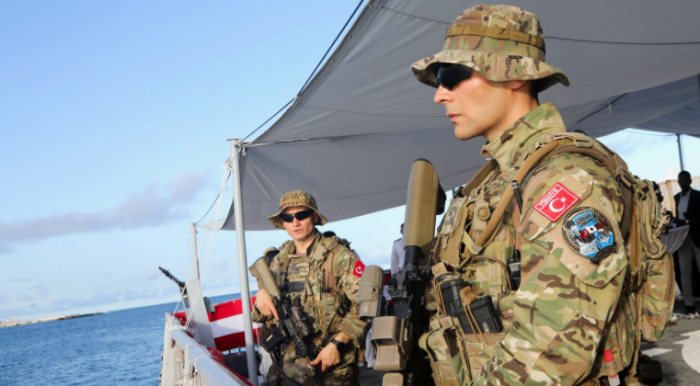
Why Somaliland Now Matters More Than Ever in the Red Sea Strategic Equation.
Turkey’s expanding footprint in Somalia is often framed as humanitarian partnership or infrastructure development. In reality, Ankara is constructing a shadow strategic order—one that uses Somalia as an offshore extension of Turkish power, giving President Recep Tayyip Erdoğan a launch corridor at one of the world’s most sensitive maritime choke points.
Under the banner of development, Turkey now trains thousands of Somali soldiers, operates the country’s central airport and port under long-term concessions, runs its flagship national hospital, and controls financial channels through Ziraat Katılım—the first foreign bank in Somalia in more than 50 years.
This is not philanthropy; it is leverage. Somalia receives security and infrastructure. Turkey receives coastline, deniability, and strategic depth.
While global headlines fixate on Houthi attacks in the Red Sea or Iran’s regional ambitions, the more decisive shift is unfolding quietly in Somalia. A NATO member is projecting power across the Horn of Africa in ways the alliance cannot monitor, Europe cannot shape, and the U.S. has been slow to recognize.
Turkey is building a second strategic geography: offshore, insulated from oversight, and designed to test capabilities that would be politically and legally constrained within NATO’s traditional framework.
Somalia is the laboratory. The Gulf of Aden–Red Sea corridor is the theatre.
Turkey’s missile-testing initiatives in Somalia—confirmed in Greek reporting by Marinos Gasiamis—are not tactical experiments but a foundational piece of Erdoğan’s long-term architecture.
This fits a decade-long pattern: nuclear infrastructure with ambiguous Russian clauses, quiet cooperation with Pakistan’s nuclear and missile expertise, exploratory uranium routes in Africa, and now a politically shielded African coastline from which missile doctrine can evolve without scrutiny.
If Turkey ever crosses the nuclear threshold, the balance that underpins deterrence from the Aegean to the Gulf would fracture.
The systems Ankara could test or deploy from Somali territory would outrun early-warning grids that regional states rely on—forcing a security recalculation across the Middle East and Africa.
None of this works without a compliant host. Somalia sold the keys.
Through bases, concessions, doctrinal influence, and total dependency, Turkey has created a model of “parallel sovereignty.” Somalia’s army, airports, ports, and financial arteries now run through Ankara.
This mirrors the Libyan playbook: enter through crisis, remain through law, cement through dependency.
But the Red Sea corridor is more volatile. Iran’s Houthi proxies close the strait with missiles; Turkey deepens its presence on the opposite shore; Iran gains reach; Turkey gains flexibility; and Europe loses the ability to distinguish cause from consequence.
A proxy system does not require coordination—just overlapping interests.
Israel, observing this map, is not blind. The flight distance from Israeli airbases to Mogadishu is comparable to its proven operational reach into Iran. Somalia is not beyond Israel’s horizon nor its doctrine of preemptive strike. Silence should not be misread as comfort.
But the Horn of Africa has two coastlines—and only one is behaving like a sovereign state.
Somaliland, despite lacking formal recognition, stands as the counter-model: self-governing, democratic, and strategically positioned. Unlike Mogadishu, it has not leased its coastline to foreign ambitions.
Berbera, upgraded with UAE investment, now hosts early-warning systems acquired with third-party approval from Israel—quiet confirmation that the region’s strategic planners recognize Somaliland as an anchor of stability.
Recognition of Somaliland is not a moral gesture; it is a strategic correction. As Somalia becomes a proxy corridor for outsourced sovereignty, Somaliland remains the last intact coastline on the Red Sea route not absorbed into someone else’s strategic design.
The choice facing the international system is urgent: strengthen the only democratic, stable governance structure in the Horn—or watch Turkey’s shadow geography consolidate in silence until it becomes a permanent fact.
In a corridor shaped by speed and opportunism, hesitation is a decision in itself, and one that increasingly benefits Ankara.
Analysis
Can India Balance a US Trade Deal and a Warm Welcome for Putin?

As Vladimir Putin stepped off his aircraft in New Delhi and into an embrace from Prime Minister Narendra Modi, the moment crystallized India’s increasingly complex diplomatic posture.
Modi is courting Washington for a trade breakthrough while simultaneously rolling out the red carpet for one of America’s most sanctioned adversaries. It is a dual-track strategy that reflects India’s rising confidence—and the growing leverage it believes it can extract from both sides.
Putin’s visit, his first to India since launching the war in Ukraine, comes at a moment of economic pressure for Modi. New Delhi is negotiating a trade deal with Washington, urgently seeking relief from the steep 50% tariffs imposed by President Donald Trump, partly in response to India’s aggressive purchasing of cheap Russian oil.
India has made gestures to ease tensions, trimming its Russian crude imports and committing to buy millions of tons of US liquified petroleum gas. Yet, the optics of Modi hugging Putin as he arrives for talks will not go unnoticed in Washington.
For India, however, the relationship with Moscow is not optional. Much of its military hardware still originates from Russia, and New Delhi sees ongoing defense cooperation—including potential purchases of advanced Su-57 fighters—as essential to maintaining deterrence against Pakistan and China.
This necessity is sharpened by the fact that Russia remains a close partner to Beijing, even as China supplies the bulk of Pakistan’s modern arsenal. India, sitting between two nuclear-armed rivals with whom it has unsettled borders, views diversification as strategic insurance.
Economically, the partnership has deepened since the Ukraine war began, with India emerging as one of the largest buyers of discounted Russian oil. Western frustration has mounted, culminating in Trump’s tariffs and renewed scrutiny of India’s trade balance.
Putin has rejected the criticism outright, pointing to ongoing US purchases of Russian nuclear fuel and questioning why India should be held to a different standard.
This financial pressure, ironically, appears to be nudging India closer to Beijing. Modi’s recent trip to China—the first in seven years—signaled that New Delhi is willing to keep multiple diplomatic doors open, especially when it feels cornered by Washington’s economic measures.
Still, the Biden and Trump administrations alike have viewed India as an essential counterweight to China, expanding defense cooperation and technology transfers.
New Delhi remains confident that it can pursue a deep trade pact with Washington while maintaining a “time-tested” friendship with Moscow.
Whether India can keep this balance without provoking Washington remains to be seen.
With major defense contracts under negotiation and a trade deal still unresolved, Modi is performing one of the most delicate diplomatic tightropes in global politics—hugging Putin while hoping Trump will lift the tariffs.
-
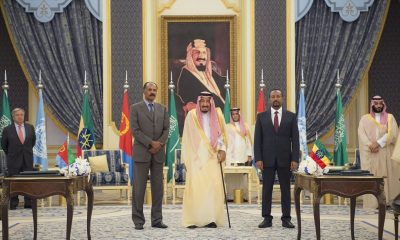
 Analysis10 months ago
Analysis10 months agoSaudi Arabia’s Billion-Dollar Bid for Eritrea’s Assab Port
-

 Opinion17 years ago
Opinion17 years agoSomaliland Needs a Paradigm Change: Now or Never!
-

 Interagency Assessment5 days ago
Interagency Assessment5 days agoTOP SECRET SHIFT: U.S. MILITARY ORDERED INTO SOMALILAND BY LAW
-
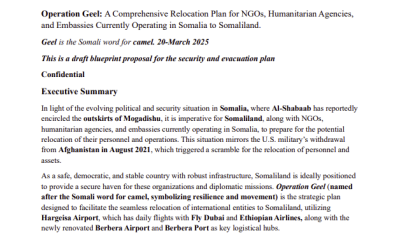
 ASSESSMENTS9 months ago
ASSESSMENTS9 months agoOperation Geel Exposes the Truth: International Community’s Reluctance to Embrace Somaliland as a Strategic Ally
-

 Somaliland11 months ago
Somaliland11 months agoSomaliland and UAE Elevate Ties to Comprehensive Strategic Partnership
-

 EDITORIAL1 year ago
EDITORIAL1 year agoDr. Edna Adan Champions the Evolving Partnership Between Somaliland and Ethiopia
-
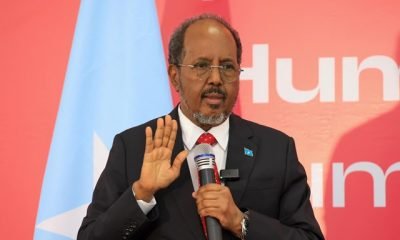
 ASSESSMENTS6 months ago
ASSESSMENTS6 months agoA Critique of the Hassan Sheikh Mohamud Administration and the Halane Enigma
-

 Africa2 years ago
Africa2 years agoHow Somaliland Could Lead the Global Camel Milk Industry


